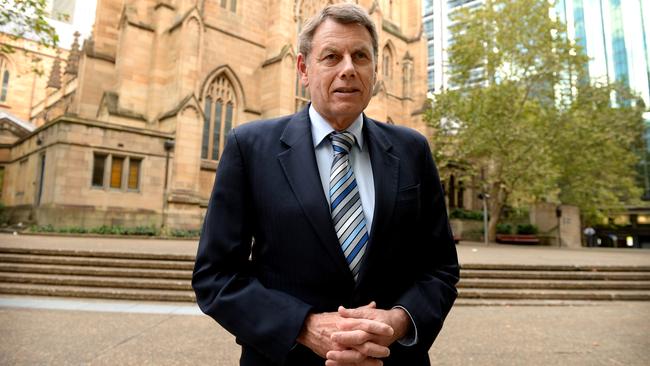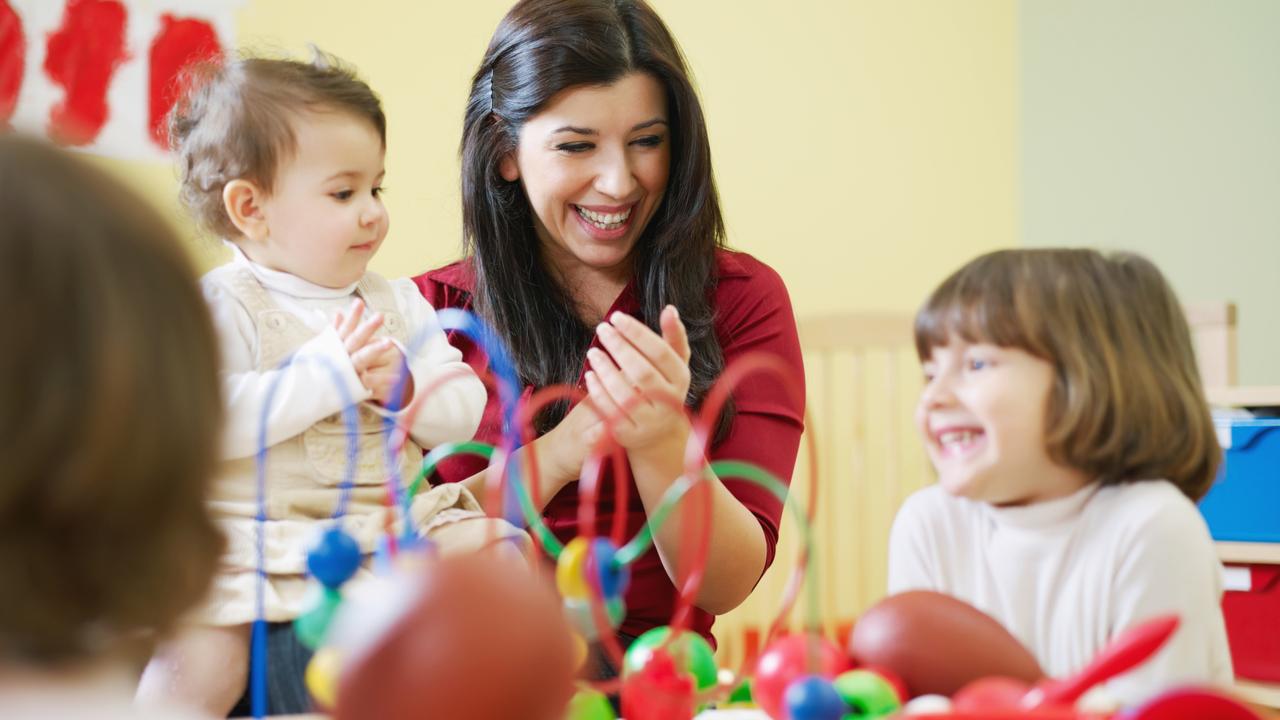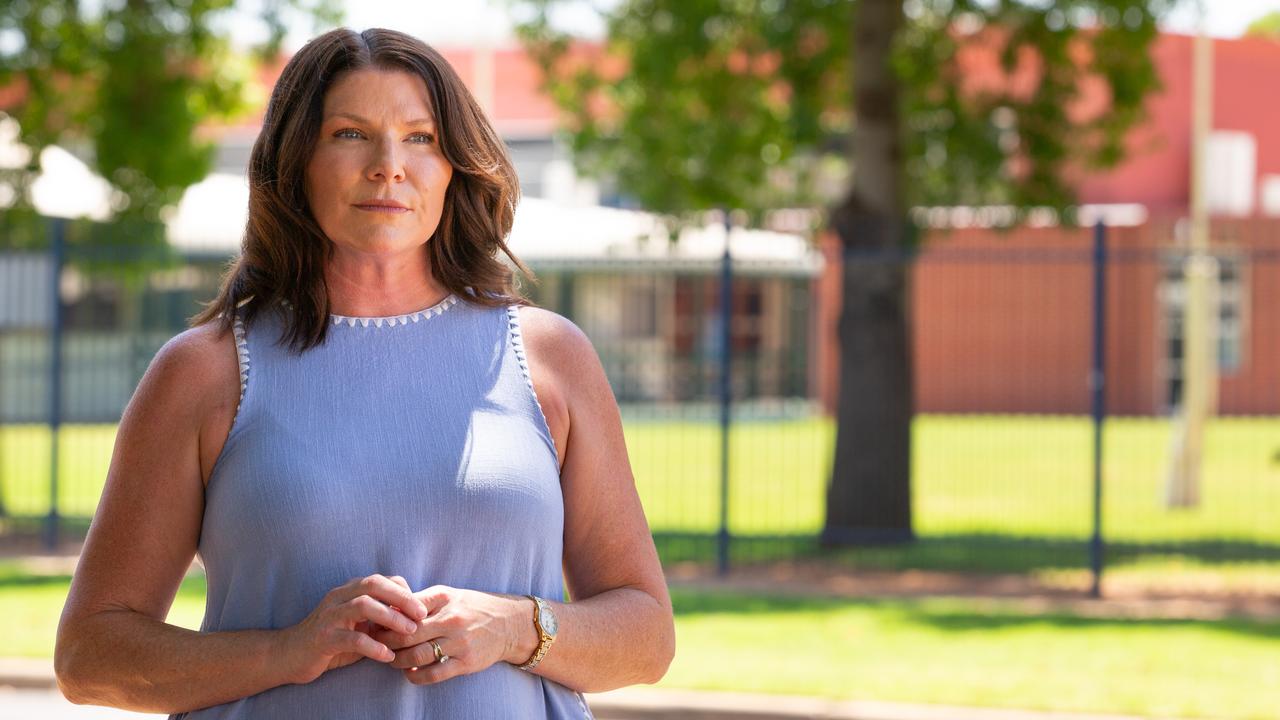Headmaster warns parents to behave or face school ban
A Sydney private school headmaster has threatened to ban parents who abuse and threaten his teachers from school grounds.

A Sydney headmaster who has declared a tough stand against abusive and threatening parents has been backed by fellow principals, amid concern that a decline in civil behaviour is harming school communities.
John Collier, the principal of St Andrew’s Cathedral School, has also won the support of parents, after speaking out about a rise in parental agitation and aggression and warned that he would not hesitate to ban people from the schoolyard.
The veteran educator linked the bad behaviour to rising “parental anxiety”, which was compounded by a perception among some parents that the payment of school fees entitled them to make “extravagant demands” of teaching staff.
The independent Anglican school charges up to $32,000 a year for fees, ranking it among the most expensive in the country.
Writing about his concerns in the school’s newsletter last month, Dr Collier said he was having to “interact with too many parents who have verbally abused, physically threatened or shouted at a staff member”.
“I have chosen to draw this matter to the attention of all parents as the frequency of incidents of unrestrained behaviour appears to be increasing,” he said.
“If necessary, I will instruct staff not to answer their phone calls or emails, and if necessary, I will assert my authority under the Inclosed Lands Act to ban them from entering the premises.”
Dr Collier, 67, who has been principal at St Andrew’s since 2010, warned that he had already used his authority to terminate the enrolment of a student in a case where the parents had been bullying staff. “I have a responsibility not only for the education of children, but under workplace health and safety legislation, to maintain a safe workplace for staff,” he said.
Dr Collier acknowledged some people might not appreciate his remarks, but his stand was backed by the Association of Heads of Independent Schools of Australia, which said he was right to take steps to protect staff. “I think every school leader in Australia will understand what Dr Collier is referring to,” association chief executive Beth Blackwood said.
“Not only is there a decline in civility in our society, we are also in danger of undermining the very important role schools play in teaching young people how to be part of and contribute to a community.”
Ms Blackwood pointed to results from the recent Principal Health and Wellbeing Survey that revealed almost half of respondents had faced threats of violence at work, and one in three had experienced violence.
Dr Collier told The Australian that although no parents had become violent, there were cases where “highly emotive individuals” had expressed anger, aggression and vehemence.
“We had to have a couple of (parents) in, one by one, to discuss matters, but it really is a minority,” he said.
“But it needs to be called out because it’s just not acceptable.”
Dr Collier said some parents were working themselves into states of high anxiety over single incidents and risked inadvertently passing the stress on to their children.
He highlighted a case in which a parent had complained that their child’s “life was actually over” because of a poor test score, and another in which a parent was unwilling to accept their daughter had committed an offence even though it had been seen by 13 members of staff.
NSW Parents’ Council executive director Steven Grieve, who has a son in Year 9 at St Andrew’s, supported Dr Collier’s position.
“I very strongly believe in parental engagement and that schools need to be proactive n engaging with families about their children's education,” he said. “But I equally believe that these exchanges have to be conducted in a polite and cordial fashion.’’
St Andrew’s parent Sue McMahon, whose son is in the junior school, said she was disappointed to learn that there had been instances of aggression.
“The school is fantastic, the teachers are fantastic and I don’t think there should be any abuse of teachers,” Ms McMahon said.
Another parent, who declined to be identified, said he was “fully supportive” of the principal. “People need to understand that they don’t own a teacher simply by paying fees,” he said. “It’s just rubbish.”
Additional reporting: Rhian Deutrom
—
Here is the Principal’s letter in full
How should parents act when their child has a problem at school?
Most parents will recall the beat of the song (was it from the 80s?) “Don’t worry, be happy”. The lyrics were amongst the most vacuous I have heard. Nonetheless, to a degree, I commend the message to you. How and why? You will see below.
In my 28 years (so far) as a Head of School, I have noticed a considerable increase in parental anxiety. This may reflect increasing anxiety in society generally. It also seems to indicate a forensic focus on the present, often without the perspective of the long view.
As parents, we tend to react when we perceive our child is threatened. This seems to bring forth a reptilian kind of defensive response. Recently I read of a hippopotamus in a river in Africa, which, seeing a crocodile move towards her offspring, bit its head off! Sometimes as parents we can be a bit like that.
The culture at SACS has always been one of gracious engagement. For a minority of parents, this tone seems to be in decline. I am having to interact with too many parents who have verbally abused, physically threatened or shouted at a staff member. People who do this should engage in some role reversal: if someone behaved in this way towards you, would it be helpful and would it motivate you to assist them? Parents need to ask other questions as well, such as: “Is my child’s view of the universe entirely correct, or is it partial or jaundiced in some way?” “Are my expectations reasonable in a school?” “Does my child have the maturity to be able to appraise this situation in all its dimensions?” “Is the issue worthy of this level of hostility?” “Should my child be able to manage this himself or herself as a learning experience?”
A couple of years ago, a Middle School parent said to me that he knew the thirteen staff members who had observed his daughter committing an offence were all lying, as his daughter said she was innocent. It is very hard to make progress with this level of unreality.
Recently, a Middle School parent said to me that as her daughter had done poorly in her test, her life was actually over! Actually, it wasn’t. Often, frustratingly to parents, children do not peak until Senior College. Some really don’t get going until tertiary study. We need to avoid living vicariously through our children. They will march off to the beat of a different drum.
My advice to parents who work themselves into a state of high anxiety over single incidents, or even sets of incidents, is to take a step back and look at the long view. Parents who regularly place this stress upon themselves will be nervous wrecks by the end of Year 12! Moreover, they often inadvertently pass on this stress to their children, so worsening rather than improving the problem.
Most commonly, this level of angst occurs in the early stages of Middle School with the oldest child in the family. Often this appears to be because parents have not understood that High Schools are different from Junior Schools in the level of responsiveness teachers can make. While a Junior School teacher, with 14 to 22 students, may be able to interact with parents by phone or email really frequently, high school teachers with up to six classes and 150 students, often sophisticated content material to master for senior years and very extensive marking of lengthy pieces, cannot do that. No high school pretends to be a tutoring service, but in fact, deals with large classes of students.
I recommend the advice of the Apostle Paul, in his letter to the Colossians, to parents and staff: “Let your speech always be gracious, seasoned with salt, so that you may know how you ought to answer each person” — Colossians 4:6. Mutual respect and calm interchange is always the best. Rather than a fiery contact, a good opening could be “my child says … do you think that is accurate?” Or “I think we may have a problem here, can you please assist in resolving it?”
I am aware some parents, because they are paying fees, see the relationship with teachers as a master/servant relationship, such that they are entitled to make extravagant demands. Even in a mercenary sense, this is hardly true. Two parents would be contributing around 2/1300ths of that part of the teacher’s salary which is funded by parents (a small part is funded by the government), and that is hardly a sufficient commercial relationship to prescribe how teachers act! In pragmatic terms, that is, what works, the relationship between parents and teachers is best seen not as a commercial transaction, but as a partnership where both combine together for the good of the child.
I have a responsibility not only for the education of children, but under workplace health and safety legislation, to maintain a safe workplace for staff. I am very displeased at the current level of agitation from a minority of parents. If necessary, I will instruct staff not to answer their phone calls or emails, and if necessary, I will assert my authority under the Inclosed Lands Act to ban them from entering the premises. Last year, I used this authority to terminate an enrolment where the relationship with the parents had entirely collapsed as they were in effect bullying staff on a daily basis.
I have chosen to draw this matter to the attention of all parents as the frequency of incidents of unrestrained behaviour appears to be increasing. While some schools may regard that as normal, it has never been the case here and will not be acceptable at SACS. I take it this drift is part of a general decline in civility in society, and needs to be called out. We want to be better than any kind of basic common denominator.
While some may not appreciate these remarks, my nature is to be forthright and transparent, and I am confident enough that the great majority of parents, who are always delightful in their interactions and very appreciative of staff, will approve. This is because they want their children’s teachers to be able to teach well at an optimal level and not be stressed by aggression, usually misplaced and misconstrued, by a small minority. Where substantial and substantive issues actually exist, they can normally be resolved by a courteous, calm interchange. Where necessary, the situation can be formalised through the school’s Grievance Policy.
My experience is that some parents who are highly stressed and highly accusative eventually leave the school, seeking greener pastures. In fact, in such cases, there is clearly not going to be any school which will ever satisfy them or meet their extravagant expectations. Unfortunately some will follow the pattern of moving every year or two, unreasonably dissatisfied, searching for perfection they will never find, and actually, in uprooting their children, impeding their school performance. They are like the subject of Australia Poet Bruce Dawe’s poem, Drifters “she won’t even ask why they’re leaving this time, or where they’re headed for; she’ll only remember how, when they came here …”
It is far better to work in the real world instead of a projected ideal and aim to achieve the best of what is always going to be a human situation despite the foibles of people. These people with foibles are also known as children, teachers and parents.
As our children would say to us: “Chill!”
Dr John Collier
Head of School
“Let your speech always be gracious, seasoned with salt, so that you may know how you ought to answer each person” — Colossians 4:6


